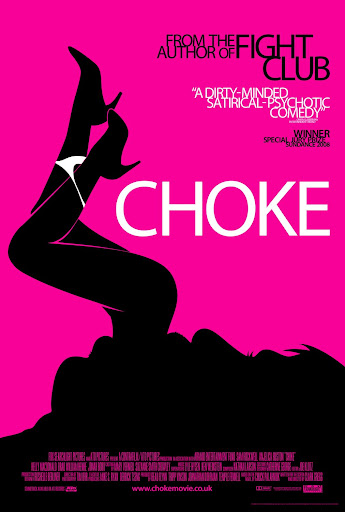
Choke is a 2008 dark comedy based on a novel by Chuck Palahniuk, written and directed by Clark Gregg. Amazon
When I’ve asked leather guys whether they’d rather make it with a real Con Ed [repair] man or a lawyer who looks like one, the question baffles them. It lies outside the system of their fantasies. In their hearts they may know that the lawyer would be more adventurous and uninhibited lover, but their passion demands he at least appear to be a worker.
White, Edmund. 1979 “Sado Machismo”, from The Burning Library: Essays , Knopf, New York, 1994
Victor Mancini (Sam Rockwell) is a recovering, self-described “sex addict”, who fakes choking in restaurants so that he can emotionally manipulate his rescuers, which is to pay for supporting his Alzheimer’s-afflicted mother Ida (Anjelica Huston). He also works as a Colonial American historical re-enactor, performing a sanitized version of historical times.
(Spoilers ahead)
Choke builds on Palahniuk’s ideas in Fight Club about masochism as a viable strategy in a hostile world. Victor scams people by putting himself in a position of vulnerability, with his fake choking performances in restaurants, and casting the people who help him as a savior. Victor’s friend Denny, also a recovering “sex addict” and a historical re-enactor, spends a lot of time in the stocks at the historical re-enactment, which actually helps him control his sex addiction.

At the care facility where Victor’s mother lives, the women patients with dementia mistake him for various people in their lives. Ida sees Victor as everybody but himself, and Victor has to get Denny to impersonate him so Victor can learn about his unknown father. This leads to more lies and false identities, with some of the women coming to believe that Victor is the literal second coming of Christ.
Victor is appalled that people think of him as good, and asks himself “What would Jesus not do?” He hooks up with an unnamed woman (Heather Burns) who wants to stage a “rape” fantasy with him as the anonymous rapist. Note that Victor doesn’t actually rape someone or otherwise do anything evil. This fits in with the book and movie’s theme of the philosopher Baudrillard’s simulacrum, “a copy of a copy without an original”, “signifier without signified”. The implication is that, in a world in which everyone and everything is a simulacrum, Victor couldn’t commit literal rape even if he tried; nor could he find true love.
Victor meets with the woman, and it becomes clear that she has a strong idea of how this scenario is to go. In other words, she’s running the fuck.
When Victor actually does the rape scene, the woman constantly criticizes his performance, and she takes out her own vibrator to get herself off. Victor is left to masturbate, just a prop in her fantasy. He gets petty revenge on her by ejaculating on her floor and then leaving. (Cf. the relationship between Evelyn and Cynthia in The Duke of Burgundy.)
Authentic relationships are nearly nonexistent in Choke. (Even Ida says she kidnapped Victor as a toddler, and has no idea who his birth parents were.) Instead, people cast other people in pre-existing roles in their heads: friend, mother, son, savior, rapist, confidante, victim, etc. Some people acquiesce to this casting; every role has its emotional rewards. But, eventually, there is always disappointment.
Victor’s scene with the unnamed woman is meant to be just another one of his anonymous, transient sexual encounters (all heterosexual, but that’s another issue). Even the physicality of sex does not break through to the real. In this view, roleplay is another form of alienation, agreeing to be each other’s simulacra. From a BDSM perspective, however, this could be seen as an attempt at connection with another person. It’s certainly morally better than actually sexually assaulting someone.
Baudrillard said the world of simulacra was humanity’s self-imposed problem, while fellow philosopher Gilles Deleuze (who wrote extensively on masochism and Venus in Furs) saw recognition of simulacra as a means to overthrowing privileged ideals. I.e. in Choke, the solution to Victor’s problem is not a heterosexual, monogamous, vanilla, romantic/companiate relationship (the supposed “real”), instead of his “circuit” of casual hookups (the supposed inferior “copy”).
It’s a true image, born of a false spectacle.
Jean Genet (1994). “The Balcony”, p.42, Grove/Atlantic, Inc.



